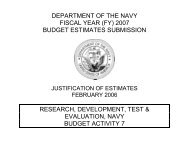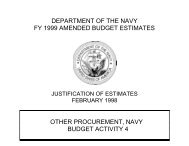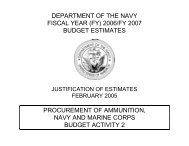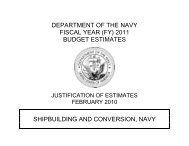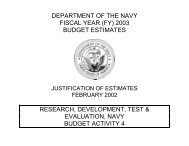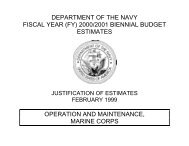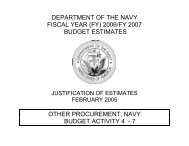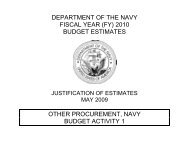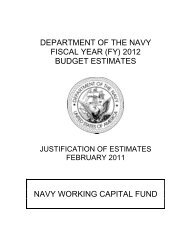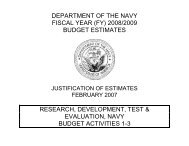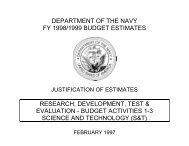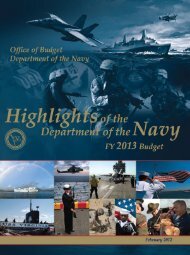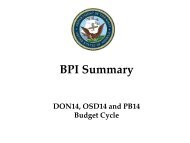- Page 1 and 2:
UNCLASSIFIED DEPARTMENT OF THE NAVY
- Page 3 and 4:
Brief of Revisions Following are th
- Page 5 and 6:
22.075322. Revises paragraph to pro
- Page 7 and 8:
Change Numbers And Issuance Dates C
- Page 9 and 10:
074005 Management Funds............
- Page 11 and 12:
074562 Budget Formulation .........
- Page 13 and 14:
Section VI: Interservice and Interd
- Page 15 and 16:
FINANCIAL MANAGEMENT POLICY MANUAL
- Page 17 and 18:
NAVSUP P-409 or P-437 using AUTODIN
- Page 19 and 20:
apportionment requests for appropri
- Page 21 and 22:
2. TEMPORARY LAPSE IN APPROPRIATION
- Page 23 and 24:
military functions covered by the a
- Page 25 and 26:
commands or activities, prior to re
- Page 27 and 28:
appropriation level, prepared on an
- Page 29 and 30:
other subdivision of the appropriat
- Page 31 and 32:
intention that they be considered a
- Page 33 and 34:
newly authorized. Distribution of a
- Page 35 and 36:
increasing the allotment or for imp
- Page 37 and 38:
Chiefs of Staff, and to activities
- Page 39 and 40:
claimant financial authority made a
- Page 41 and 42:
authorized by the agent will be sig
- Page 43 and 44:
a. Military Personnel: Cumulative i
- Page 45 and 46:
upward obligation adjustments durin
- Page 47 and 48:
Appropriation Program, Project and
- Page 49 and 50:
each account being charged; or the
- Page 51 and 52:
7. Sources. Additional information
- Page 53 and 54:
appointment of the ADA investigator
- Page 55 and 56:
also provided for research, develop
- Page 57 and 58:
SECNAVINST 7040.10 as to primary an
- Page 59 and 60:
elements of the FYDP structure. In
- Page 61 and 62:
is sent to the Office of the Comptr
- Page 63 and 64:
6. special duty assignment pay; 7.
- Page 65 and 66:
the President's annual budget. The
- Page 67 and 68:
6. basic pay, inactive duty trainin
- Page 69 and 70:
c. Special Training. Special traini
- Page 71 and 72:
f. Senior Reserve Officers' Trainin
- Page 73 and 74:
(Change 67) 2. subsistence; 3. trav
- Page 75 and 76:
deposits, gratuities, permanent cha
- Page 77 and 78:
extended active duty, including eme
- Page 79 and 80:
Reserve Personnel, Marine Corps (RP
- Page 81 and 82:
3. BUDGET ACTIVITY 2, OTHER TRAININ
- Page 83 and 84:
4. other pay and allowances, enlist
- Page 85 and 86:
types of programs such as the Marin
- Page 87 and 88:
"For expenses, not otherwise provid
- Page 89 and 90:
position subhead. A single position
- Page 91 and 92:
AG's program value. Reprogramming b
- Page 93 and 94:
position subhead. A single position
- Page 95 and 96:
may be further divided into managem
- Page 97 and 98:
2. FISCAL YEAR 1994 AND SUBSEQUENT:
- Page 99 and 100:
This substitution allows calculatio
- Page 101 and 102:
to limitations stated in the curren
- Page 103 and 104:
programs for ease of administration
- Page 105 and 106:
prior to approval of title, as foll
- Page 107 and 108:
available for obligation commencing
- Page 109 and 110:
procurement programs, all estimates
- Page 111 and 112:
2. Extended Period of the Appropria
- Page 113 and 114:
with the expressed desires of Congr
- Page 115 and 116:
3. EXECUTION a. Program-Year Concep
- Page 117 and 118:
2. BUDGET ACTIVITY 1, NAVY AMMUNITI
- Page 119 and 120:
074360 SCOPE 1. GENERAL. Section V:
- Page 121 and 122:
and special shore activities with e
- Page 123 and 124:
the Office of Management and Budget
- Page 125 and 126:
obligation adjustments and payments
- Page 127 and 128:
3. EXECUTION. a. General. PMC is co
- Page 129 and 130:
3. BUDGET ACTIVITY 2, APPLIED RESEA
- Page 131 and 132:
changes by the ONR Comptroller. 4.
- Page 133 and 134:
is designed to accelerate obligatio
- Page 135 and 136:
Congress, SECNAV must report to Con
- Page 137 and 138:
First two digits - Administering of
- Page 139 and 140:
project for an existing facility mu
- Page 141 and 142:
d. Operation and Maintenance Limita
- Page 143 and 144:
Section III: FAMILY HOUSING, NAVY A
- Page 145 and 146:
(8) restorations of dwelling unit o
- Page 147 and 148:
2275) also issued, as appropriate;
- Page 149 and 150:
eprogramming purposes and any repro
- Page 151 and 152:
estoration: Provided further, That,
- Page 153 and 154:
5. OPERATION AND MAINTENANCE. This
- Page 155 and 156:
After Mission Ceases BOS BRAC or O&
- Page 157 and 158:
applies to both direct funded and N
- Page 159 and 160:
2. FUND MANAGEMENT. All cash, funct
- Page 161 and 162:
sustainment, restoration and modern
- Page 163 and 164:
7000.14-R, Financial Management Reg
- Page 165 and 166:
programs to pay for potentially hig
- Page 167 and 168:
customers, to include the costs of
- Page 169 and 170:
. Ship Acquisition. The ship acquis
- Page 171 and 172:
g. Economy Act orders will be issue
- Page 173 and 174:
U.S. Code 2601. Under the provision
- Page 175 and 176:
The Navy Supply Systems Command (NA
- Page 177 and 178:
(1) completion of 30 years of servi
- Page 179 and 180:
obligation of estimated collections
- Page 181 and 182:
nonappropriated funds (NAF) will be
- Page 183 and 184:
074727 KAHO'OLAWE ISLAND CONVEYANCE
- Page 185 and 186:
074741 MILITARY ASSISTANCE (TRANSFE
- Page 187 and 188:
eceives full reimbursement for cost
- Page 189 and 190:
expenses incurred by DON, supportin
- Page 191 and 192:
automatic reimbursement authority a
- Page 193 and 194:
performed in connection with delive
- Page 195 and 196:
existing prior year orders may be a
- Page 197 and 198:
Chapter 3 FINANCIAL RESPONSIBILITY
- Page 199 and 200:
components are part of and function
- Page 201 and 202:
Group 13) are considered investment
- Page 203 and 204:
h. Procurement/Production Program C
- Page 205 and 206:
one of three ways, as prescribed in
- Page 207 and 208:
5. CHANGING BASIS OF SUPPORT a. Tim
- Page 209 and 210:
3. POLICY. Functional transfers sho
- Page 211 and 212:
year and budget year columns of the
- Page 213 and 214:
eal property. The activity with the
- Page 215 and 216:
075122 SIGNIFICANT COSTS Costs to t
- Page 217 and 218:
a. Shelter/Subsistence · Galley -
- Page 219 and 220:
SPECIAL CIRCUMSTANCES IN SUPPORT RE
- Page 221 and 222:
activities, in this instance, are n
- Page 223 and 224:
number of cars to be used related t
- Page 225 and 226:
funding responsibility of the Naval
- Page 227 and 228:
. Cognizance Symbol 0I. Cognizance
- Page 229 and 230:
connection with assignment to and d
- Page 231 and 232: Services Administration, Part 101-4
- Page 233 and 234: . Organizational Component. The ter
- Page 235 and 236: or Head Quarters, U.S. Marine Corps
- Page 237 and 238: 075147 LONG-TERM TRAINING AND EDUCA
- Page 239 and 240: c. Boats. Boats are water-borne non
- Page 241 and 242: etc.) is also chargeable to that ac
- Page 243 and 244: to the major claimant having lease/
- Page 245 and 246: duties. Organizational clothing (wh
- Page 247 and 248: c. Waived Costs. Costs of support t
- Page 249 and 250: (Change 63) c. Staffing. Civilian p
- Page 251 and 252: and, therefore, is funded by COMNAV
- Page 253 and 254: y the activity that provides the se
- Page 255 and 256: (7) Nonscope Claims. By 10 U.S.C. 2
- Page 257 and 258: such payments from existing operati
- Page 259 and 260: personnel who are paid from appropr
- Page 261 and 262: assignment to an advisory group wil
- Page 263 and 264: c. Transportation and Handling Perf
- Page 265 and 266: authorized under the criteria state
- Page 267 and 268: Program shipments, the cost is reim
- Page 269 and 270: 075182 TRANSPORTATION OF MARINE COR
- Page 271 and 272: appropriations in support of TAD tr
- Page 273 and 274: g. Special Assignments. Special ass
- Page 275 and 276: TRAVEL REQUIREMENT FUNDED BY Guards
- Page 277 and 278: TRAVEL REQUIREMENT FINANCIAL RESPON
- Page 279 and 280: udget responsibility of the Militar
- Page 281: 075186 TRAVEL AND TRANSPORTATION AL
- Page 285 and 286: 075188 TRAVEL IN CONNECTION WITH RE
- Page 287 and 288: authority, and are accepted if such
- Page 289 and 290: (1) Common-Use Facility. A "common-
- Page 291 and 292: e provided by the host without reim
- Page 293 and 294: . Common-Service Activity. A common
- Page 295 and 296: MANAGEMENT MILITARY DEPARTMENT ACTI
- Page 297 and 298: tuition-free basis. The cost of suc
- Page 299 and 300: . Budget Policy (Change 63) (1) Bas
- Page 301 and 302: conditions directs the storage or m
- Page 303 and 304: . NCR Space. The Administrative Off
- Page 305 and 306: each military department. The amoun
- Page 307 and 308: activities providing support to Sta
- Page 309 and 310: for RRF ship activation should be d
- Page 311 and 312: . Intracontinental and field suppor
- Page 313 and 314: esources that support special opera
- Page 315 and 316: 2. INTERNATIONAL BUDGET COSTS. Inte
- Page 317 and 318: Infrastructure appropriation. In or
- Page 319 and 320: fuel in a reasonable period of time
- Page 321 and 322: members. b. Exclusions. There will
- Page 323 and 324: (Change 66) issuance of DODD 1330.1
- Page 325 and 326: estimated cost to deliver the contr
- Page 327 and 328: hand, is a part of the execution ph
- Page 329 and 330: . other production support services
- Page 331 and 332: However, the full cost of these ite
- Page 333 and 334:
funded. The inclusion of recurring
- Page 335 and 336:
programs until amortized. When prog
- Page 337 and 338:
2. STANDARD DEFINITIONS. Standard d
- Page 339 and 340:
Contractor Engineering and Technica
- Page 341 and 342:
. Equipment Installation. The term
- Page 343 and 344:
issuance of SECNAVINST 7040.6 and O
- Page 345 and 346:
075363 MAJOR EQUIPMENT OR COMPONENT
- Page 347 and 348:
sent to a ship, an aircraft, a unit
- Page 349 and 350:
procurement appropriation as the eq
- Page 351 and 352:
successful development of the conce
- Page 353 and 354:
1. CETS will not exceed the 12-mont
- Page 355 and 356:
procurement, distribution, and repa
- Page 357 and 358:
075371 INFORMATION TECHNOLOGY, AUTO
- Page 359 and 360:
appropriations, as determined by th
- Page 361 and 362:
udgeted in the procurement appropri
- Page 363 and 364:
3. SCOPE OF SCN FUNDING a. Ship Equ
- Page 365 and 366:
voluntarily and do not perform an o
- Page 367 and 368:
Development, Test and Evaluation, N
- Page 369 and 370:
is provided as project restrictions
- Page 371 and 372:
liquidated damages assessed contrac
- Page 373 and 374:
2. CONTINGENCY PROJECTS. Within the
- Page 375 and 376:
and maintenance, with approval from
- Page 377 and 378:
075387 DEMOLITION WORK 1. GENERAL D
- Page 379 and 380:
military utility or cost reduction
- Page 381 and 382:
2. GUIDANCE FOR BUDGET FORMULATION
- Page 383 and 384:
provide financing to cover the cost
- Page 385 and 386:
4. BUDGETING FOR TERMINATION LIABIL
- Page 387 and 388:
operational suitability, identify n
- Page 389 and 390:
and cost/effectiveness studies and
- Page 391 and 392:
constructed under this section on p
- Page 393 and 394:
n. Development Efforts Related to F
- Page 395 and 396:
for doctrine, operational, or organ
- Page 397 and 398:
integration, test, or evaluation ef
- Page 399 and 400:
i. Low Rate Initial Production (LRI
- Page 401 and 402:
studies and analyses eligible for p
- Page 403 and 404:
applicable to MWR activities. The C
- Page 405 and 406:
from those in Category A, primarily
- Page 407 and 408:
Section II: BUDGET POLICY FOR OPERA
- Page 409 and 410:
o. investment equipment in support
- Page 411 and 412:
essential for the provision of exec
- Page 413 and 414:
6. CHILD CARE. Naval facilities may
- Page 415 and 416:
to prevent waste, loss and unauthor
- Page 417 and 418:
5. RESPONSIBILITIES a. BUPERS (PERS
- Page 419 and 420:
2. MILITARY CONSTRUCTION. Military
- Page 421 and 422:
A Academy Gift and Museum Fund ....
- Page 423 and 424:
ASN (Installations & Environment) (
- Page 425 and 426:
Command support equipment .........
- Page 427 and 428:
General ...........................
- Page 429 and 430:
Port Services .....................
- Page 431 and 432:
Interim contractor support (ICS) ..
- Page 433 and 434:
Defense Health Program.............
- Page 435 and 436:
Oceanography ......................
- Page 437 and 438:
Programs, Major Future Years Defens
- Page 439 and 440:
S Sailaway concept ................
- Page 441 and 442:
In Kind ...........................
- Page 443:
Utilities Appropriations, MCON ....



